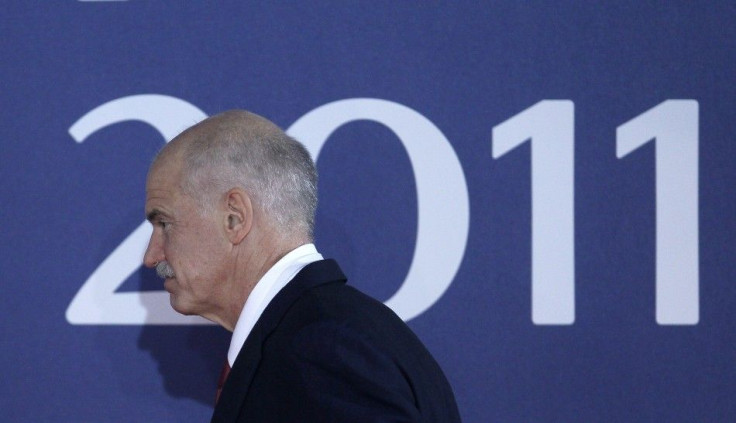Papandreou Likely to Step Down, Propose Coalition Government

Embattled Greek Prime Minister George Papandreou will reportedly step down from power after his plan to put the latest Eurozone rescue deal to a referendum vote has failed to attract the support of his own party’s MPs and ministers.
While Papandreou confers with other European Union (EU) leaders at the G20 summit in Cannes, France, the Greek cabinet is convening an emergency meeting in Athens.
Papandreou's ruling Socialist Pasok party has a slender majority in the Greek parliament (152 out of 300 seats), thus, without the overwhelming support of Pasok MPs, the Prime Minister had no hope of getting his referendum to the public.
According to Greek state television, Papandreou will meet with Greek President Karolos Papoulias immediately after the cabinet meeting.
BBC reported that Papandreou will likely propose a coalition government with Lucas Papademos, a former senior official at the European Central Bank, becoming the new Prime Minister.
Now, needless to say, if Papandreou steps down, the proposed referendum would be cancelled, raising more worries about Greece’s immediate financial future.
Even before this latest impasse, several Pasok MPs -- in addition to scores of opposition lawmakers -- had been demanding that Papandreou resign and call an early election. Even worse, according to UK media, at least three Pasok MPs have already vowed they will not support Papandreou in Friday’s crucial confidence vote.
Perhaps as a precursor to this latest twist and turn, earlier on Thursday, Papandreou’s finance minister Evangelos Venizelos expressed his opposition to the referendum (Venizelos is regarded as a long-time rival to Papandreou).
Venizelos’ rejection was echoed by at least three other government ministers.
“Any further defections [by Pasok MPs and ministers] could lead to a government collapse, a snap election, and weeks of political uncertainty,” said Blanka Kolenikova, an analyst at IHS Global Insight in London, on Wednesday, prior to the latest development.
“The future course of events will depend on the outcome of the confidence vote, but Greece is bracing for weeks of volatility and political instability.”
Meanwhile, at Cannes, Papandreou told reporters: This [referendum] is a question of whether we want to remain in the Eurozone. That's very clear.
However, that won’t be too easy.
A spokesperson for the European Commission told reporters in Brussels that if Greece left the euro it would also have to exit the European Union (EU).
The treaty doesn't foresee an exit from the Eurozone without exiting the EU, the spokesperson said.
Venizelos has now warned that time is of the essence for Greece.
If we want to protect the country we must, under conditions of national unity and political seriousness and consensus, implement without any delay the decision of 26 October [the new rescue plan for Greece]. Now, as soon as possible, he said.
© Copyright IBTimes 2024. All rights reserved.





















